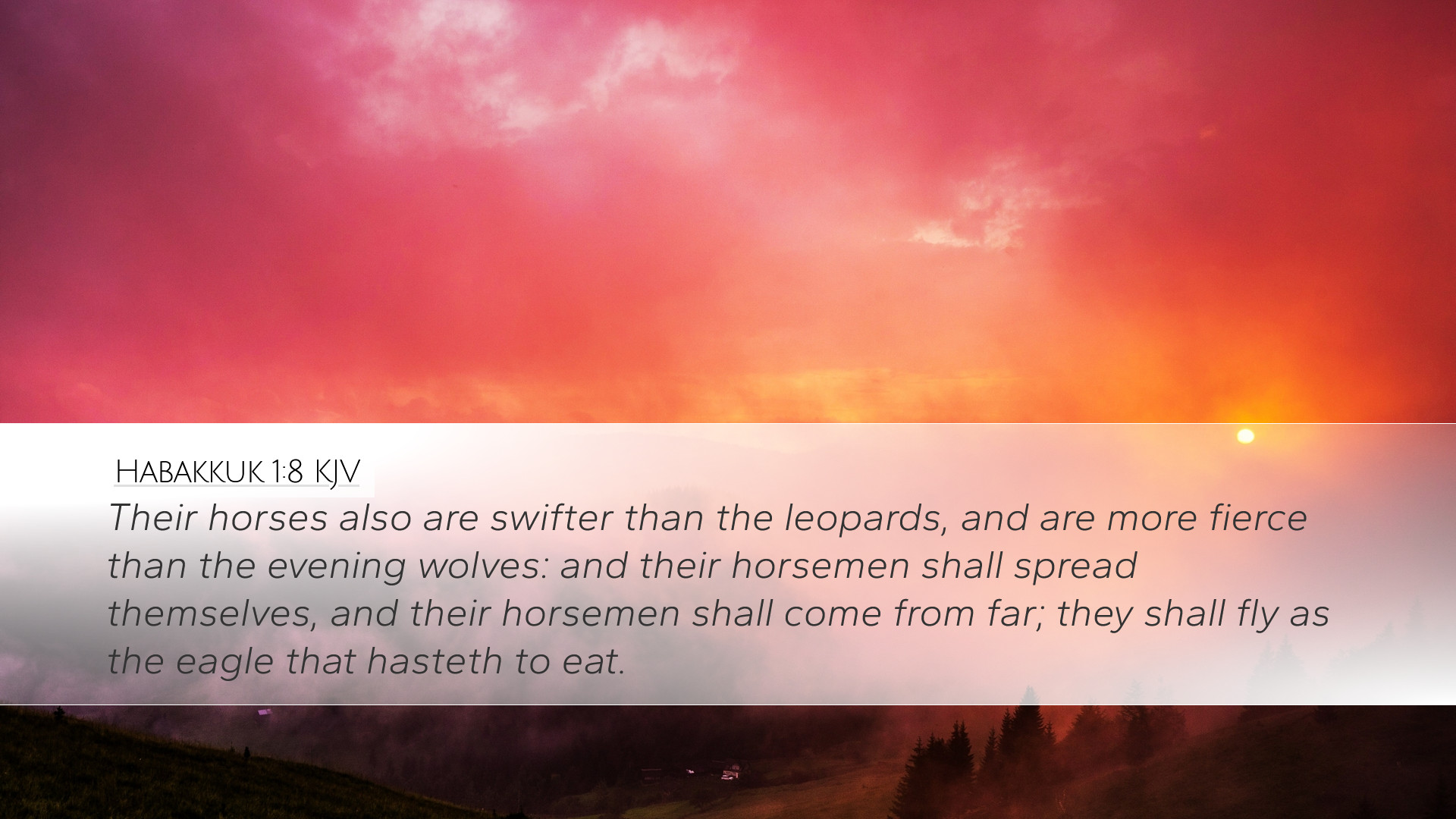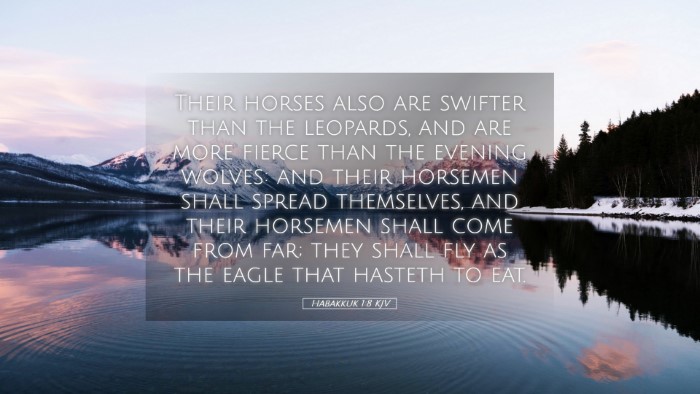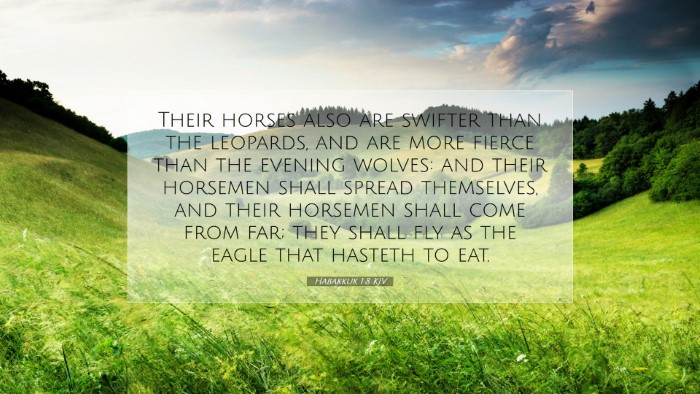Old Testament
Genesis Exodus Leviticus Numbers Deuteronomy Joshua Judges Ruth 1 Samuel 2 Samuel 1 Kings 2 Kings 1 Chronicles 2 Chronicles Ezra Nehemiah Esther Job Psalms Proverbs Ecclesiastes Song of Solomon Isaiah Jeremiah Lamentations Ezekiel Daniel Hosea Joel Amos Obadiah Jonah Micah Nahum Habakkuk Zephaniah Haggai Zechariah MalachiHabakkuk 1:8
Habakkuk 1:8 KJV
Their horses also are swifter than the leopards, and are more fierce than the evening wolves: and their horsemen shall spread themselves, and their horsemen shall come from far; they shall fly as the eagle that hasteth to eat.
Habakkuk 1:8 Bible Commentary
Commentary on Habakkuk 1:8
Verse (Habakkuk 1:8, KJV): "Their horses also are swifter than the leopards, and are more fierce than the evening wolves: and their horsemen shall spread themselves, and their horsemen shall come from far; they shall fly as the eagle that hasteth to eat."
Introduction
Habakkuk 1:8 is a striking verse that illustrates the ferocity and swiftness of the Chaldean invaders. This verse encapsulates the prophet's lament as he contemplates the impending judgment and the nature of the enemy that would come against God's people. The use of vivid imagery provides a theological and pastoral foundation for understanding the gravity of the situation. The insights from renowned public domain commentators such as Matthew Henry, Albert Barnes, and Adam Clarke will be unfolded within this commentary, offering meaningful reflections for pastors, students, theologians, and Bible scholars.
Analysis of the Text
1. Swiftness of the Horses
Henry notes that the comparison of the horses to leopards underscores their speed and agility. This imagery was essential to convey that the Chaldeans would approach with a rapidity that could not be contested. The leopards, known for their quickness, symbolize the suddenness of the invasion. Similarly, Barnes emphasizes that when God use swift animals in his analogy, He points to the rapidity of impending judgment; it is as if the horses are inextricably tied to the divine purpose in executing justice.
2. Fierceness of the Evening Wolves
This analogy serves to highlight the predatory nature of the invaders. Evening wolves, as Clarke elaborates, are more aggressive and hungry as they come out at dusk when their prey is more vulnerable. As such, this imagery calls to mind the methods of the Chaldeans, who would not only act quickly but would also do so with a ravenous intent, akin to wolves stalking their vulnerable prey under the cover of darkness. This depiction serves to instill a sense of fear and urgency regarding the judgment that is to come.
The Horsemen
The next phrase, “they shall spread themselves,” indicates a tactical approach by the enemies. Here, Henry reflects on the vastness of the invading forces. They were not merely a small contingent but a formidable army whose reach covered a large area, suggesting an orchestrated invasion rather than a disorganized raid. Barnes annotates this by stating that the Chaldeans would not be easily deterred; their multiplication and division into various formations rendered them more dangerous.
Implications of Their Coming
“They shall fly as the eagle that hasteth to eat” presents the image of a predatory bird actively seeking its next meal. Clarke notes that the eagle represents both speed and an unrelenting pursuit of its target. This metaphor serves as a profound reminder of how the Chaldean army will arrive to consume and devastate what is before them.
Theological Reflections
This verse raises profound theological implications surrounding God’s sovereignty and justice. As the Chaldeans are depicted as the instruments of divine judgment, it forces one to confront the mystery of God using even wicked nations for the accomplishment of His will—a theme that resonates throughout the prophetic literature.
God's Sovereignty
Henry emphasizes that the ultimate control lies with God, who permits the rise of wicked forces for the purification of His people. This serves as a reminder for pastors and theologians to grapple with the tension of divine justice and mercy, especially in difficult times.
Human Conditions
The descriptions of the enemy's characteristics speak to the human condition: we often find ourselves overwhelmed by forces that seem insurmountable. Albert Barnes urges contemporary readers to recognize their own predicaments where perceived adversities might overwhelm faith. The swift and fierce nature of such trials can lead us to despair unless we remember God’s overarching authority over every situation.
Conclusion
Habakkuk 1:8 encapsulates rich theological themes and a vivid depiction of the Chaldean threat, serving both an immediate context and a lasting application for believers today. Pastors and theologians can draw from the insights of Henry, Barnes, and Clarke as they teach about God’s purposes that may sometimes manifest in ways that challenge our understanding of justice and righteousness. This verse is a clarion call to the Church to remain steadfast in faith, recognizing that God remains sovereign, even amidst trials and tribulations.


